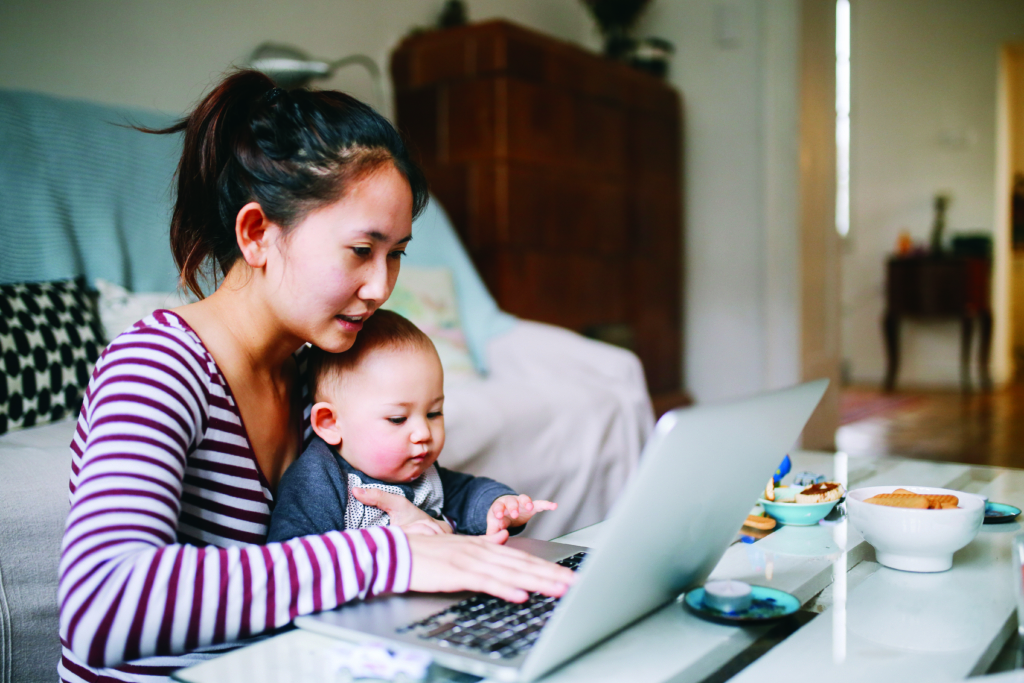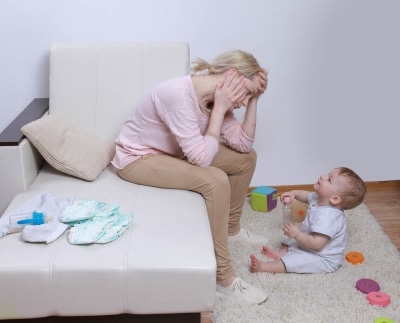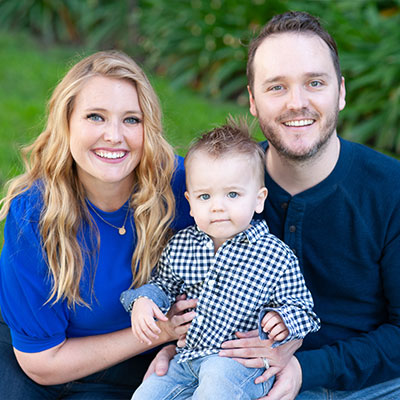Pregnancy and a new baby can bring a range of emotions. It is not uncommon for new moms to experience postpartum depression and/or anxiety. Our Virtual Maternal Wellness Program is designed specifically to help mothers experiencing these symptoms, from the comfort of their own homes.

Download the Maternal Wellness Program brochure.

We created the Virtual Maternal Wellness Program specifically to help mothers experiencing the symptoms of postpartum depression and anxiety. There is no reason to suffer in silence.
We offer treatment to women who have depression or anxiety within the postpartum period. Mothers are highly encouraged to have their baby with them during treatment.
Our program is covered by most major insurance companies as a mental health benefit.
The Virtual Maternal Wellness Program offers personalized care and includes the following:
- Intensive outpatient option (3 days a week) or,
- Partial hospitalization option (5 days a week)
- Evidence based approach
- Group therapy
- Coping skills
- Family relationship issues
- Mother and baby attachment
- Reflective Parenting
- Self and baby care skills
- Symptom management
- Transitioning into motherhood
- Individual and family therapy
- Creative arts therapy
- Mindfulness/ Relaxation/ Yoga Practice
- Lactation and dietary support
- Medication management
The birth of a baby can trigger a tidal wave of emotions, but it can also result in symptoms that new mothers may not expect. If you are experiencing several of the following for longer than two weeks, you may be experiencing a postpartum mood or anxiety disorder:
- Anxiety, panic or excessive worry
- Changes in appetite
- Difficulty concentrating or making decisions
- Difficulty doing daily tasks
- Difficulty feeling a connection to your baby
- Difficulty sleeping or sleeping too much
- Extreme fatigue not explained by sleep pattern changes due to caring for a baby
- Fearful of being alone or leaving the house
- Feelings of guilt or inadequacy
- Feeling regret for having a baby
- Hopelessness
- Intrusive thoughts related to the baby
- Isolating from friends or family
- Lack of pleasure in things that usually give you joy
- Persistent sadness
- Thoughts of death or suicide
- Unexplained anger or irritability
Postpartum mood and anxiety disorders may be caused by a combination of biological, psychological and social stressors, but it’s important to understand that these are considered a common complication of pregnancy and childbirth.
If you think you might be experiencing a postpartum mood or anxiety disorder, you are not alone: Considered the number one complication of childbirth, 1 in 7 new mothers suffer from a postpartum mood or anxiety disorder.

These illnesses can manifest any time during pregnancy and up to a year after giving birth. When left untreated, they can cause short and long-term consequences for the mother, her baby as well as their family.
Support Groups
Support groups are held virtually. Women are encouraged to have their babies take part. Our goal is to help you feel better fast and build a supportive community where you can thrive.
Our virtual program runs Mondays, Tuesdays and Thursdays from 9:30 a.m. to 12:30 p.m. From the comfort of your own home, you can participate in therapeutic support groups, which include mother-infant groups to support bonding between mom and baby, education groups, along with yoga, mindfulness meditation and more.
For more information on our program, please call: (626) 397-2323 or email [email protected]
For information on our Professional Workshops, please call: (626) 397-2323
“While I wish didn’t have the feelings and experiences of postpartum depression and anxiety, I am so very grateful that I was able to attend the maternal wellness program. From the very first day, I no longer felt totally alone. PPD is by no means a “quick fix” but with the help of the program I feel that I was able to start addressing not only my feelings at the time, but their deeper meaning and relationship to my life. It is hard work but very worthwhile. When it was time for me to leave the program, I felt that I was able to function safely, and effectively as both a parent and a partner in my marriage.” – Eloise R.
“I didn’t know what to expect when I entered the Maternal Wellness Program. I was vulnerable and overwhelmed. I never thought I could get PPD. It was a life altering experience for me. There aren’t enough of these resources out there – this program allows you to bring your baby and spouse for couples therapy services if needed. If you need help, seek help – it’s available and don’t be afraid to ask, our mental well-being is important for our children. I have not hesitated to recommend this program, I hope it helps you the way it has helped me. Eternally grateful, the grey cloud has been lifted, first time mom” – Valentina
“For me as a first time mom, post-partum care was as vital as pre-natal care, but it seems much less prevalent or even understood – it is amazing that a program like this exists and I wish it was required for all women who give birth. I was suffering from very intense post-partum depression and anxiety, and this program helped me spring back to life so quickly, I don’t know what I would have done without it. It is a place where moms can really get the care they need, when they are often used to taking care of everyone but themselves.” – Jessica
Patient Stories
Becky
View all patient stories here.
 English
English Espanol
Espanol 简体中文
简体中文 Tagalog
Tagalog հայերեն
հայերեն 한국인
한국인 Tiếng Việt
Tiếng Việt فارسی
فارسی русский
русский 日本
日本 عربي
عربي